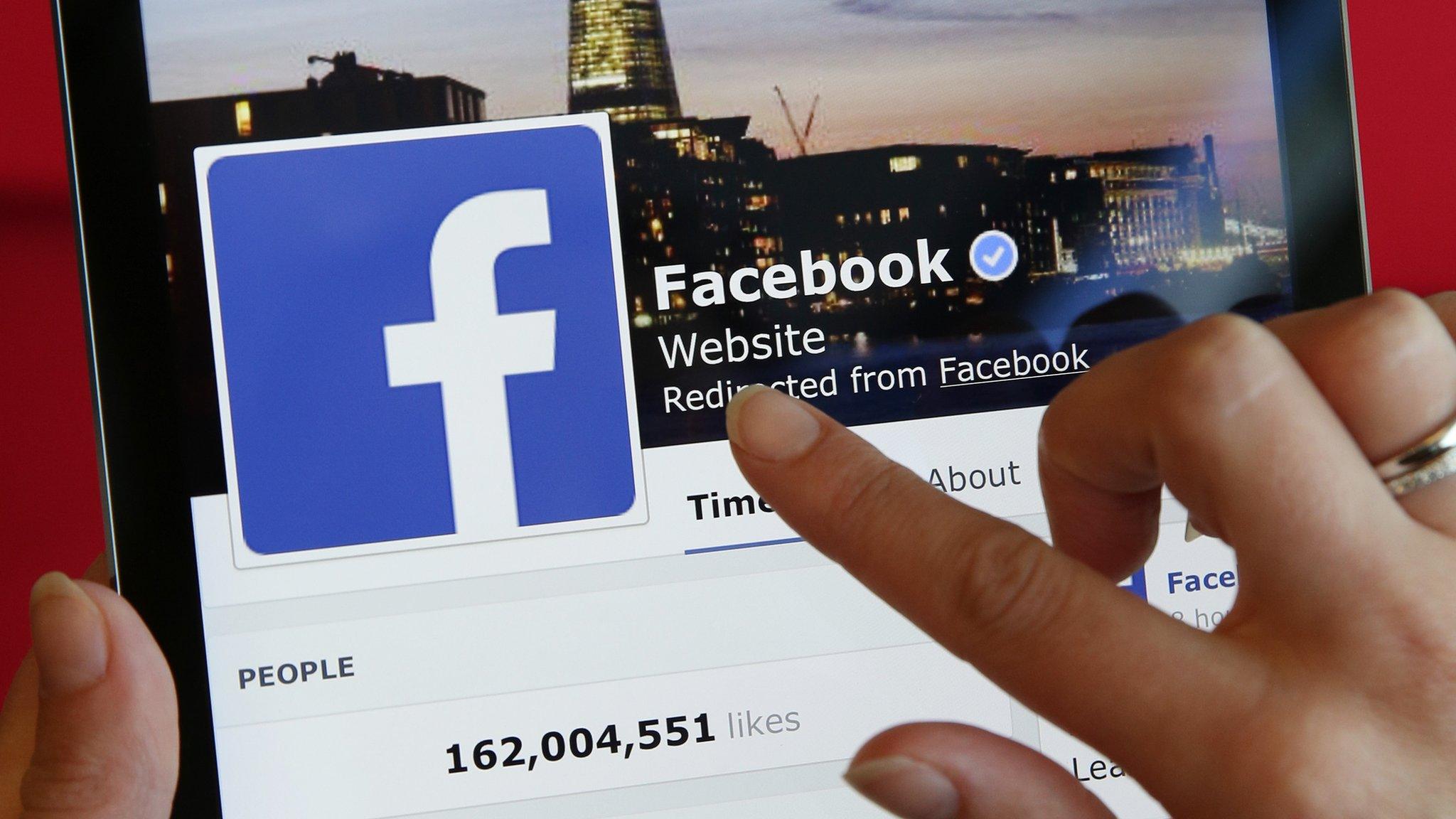Facebook opens up Messenger to third-party apps
- Published
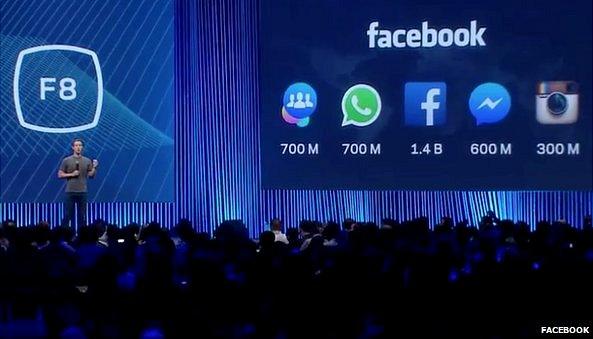
Mark Zuckerberg said Messenger had more than 600 million regular users
Facebook has confirmed that it is opening up its Messenger service to third-party developers, allowing them to add functions of their own.
It effectively completes the four-year-old software's transformation from a "lightweight" chat app, external, spun off from the main Facebook site, into a fully-fledged "platform" of its own.
More than 40 new add-on apps have already been developed so far.
But one expert said there was a risk Messenger would become bloated.
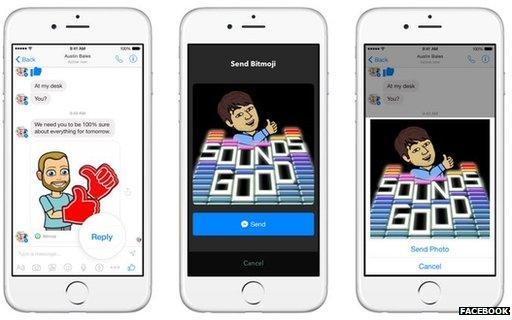
Messenger users will be able to add new types of posts generated with third-party services
Messenger has already proved controversial with some users of the social network, who have complained about having to switch between two apps to stay in touch with their Facebook friends.
Facebook's founder Mark Zuckerberg announced the move at his firm's F8 developers conference in San Francisco.
He said more than 600 million people already used Messenger at least once a month to express themselves, and that allowing other social networks and services to directly post to it would make "conversations better".
WATCH: Mark Zuckerberg goes through some of the plans for Facebook's Messenger app
Among the new apps unveiled are ways to post:
Looped animated images known as Gifs sourced from the sports TV service ESPN and elsewhere
Still images from the picture hosting site Imgur
Computer-generated animal cartoon messages with recorded audio via Talking Tom
Forecasts from the Weather Channel service
E-cards from the humour site Jibjab
Audio files from the Sound Clip
It builds on a move to allow US-based users to send money to and from each other via Messenger, which Facebook announced last week, and the earlier inclusion of Voip (voice over internet protocol) calls and stickers.
Mr Zuckerberg also revealed plans to launch an associated service called Businesses on Messenger.
Using the app instead of email, the public will be able to hold conversations with companies from which they buy goods, or have other interactions with.
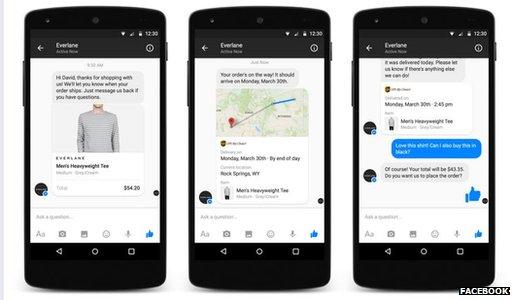
Businesses will be able to have conversations with their customers via Messenger
Facebook suggested this could include receiving delivery status updates, organising the return of an order and asking follow-up questions.
The company is far from the first to attempt to turn a messaging app into a wider platform.

WeChat allows users to buy cinema tickets and choose their seats
China's WeChat service has gone even further by allowing its users to book taxis, pick cinema seats and find nearby restaurants among other actions.
But one expert suggested Facebook should be cautious about the rate at which it adds further facilities to Messenger.
"There's a potential risk that they are going to overload Messenger with too many functions and none of them become that important - it really depends on how extensive they get with the features that they add over time," said Brian Blau from the Gartner tech consultancy.
"We have seen something like that happen with Facebook's Timeline, where you have all these different people competing for your attention.
"So, Facebook won't want to over-bloat, but it could enable all kinds of interesting scenarios where you can integrate messaging with other apps and services."


ANALYSIS
Richard Taylor, North America technology correspondent
Right now many of the Messenger apps look fun, if a bit gimmicky.
But over time these new interactions will give Facebook another source of rich information about a user's interests - and thereby the potential to attract more ad revenue.
Facebook would have taken inspiration from companies like China's WeChat and Japan's Line, which have proven successful in building both content and business services atop their core messenger offerings.
But Messenger for Business is an ambitious plan.
It is asking users to supplant more tried-and-tested means like email.
Other communications behemoths like Skype tried - unsuccessfully - to become places to reinvent communications between businesses and their customers.
Will users be happy to shift their business interactions over to Facebook - a platform where, until now, they have been used to dealing primarily with friends?

WATCH: Facebook founder Mark Zuckerberg shows off "spherical video" which will soon be supported on the site.
Other announcements made at F8 included:
Spherical video - users will soon be able to interact with 360-degree videos in their Facebook News Feeds. These are the type of immersive clips that might have been made for virtual reality headsets. YouTube recently added similar functionality
Share Sheet - third-party apps will be able to add a new feature that allows them to easily share their own content to Facebook's various services
LiveRail - a way for firms to target their video ads using Facebook's demographic data about its users. Facebook bought LiveRail, which used to be an independent firm, in July for a reported $500m (£336m)
- Published16 March 2015
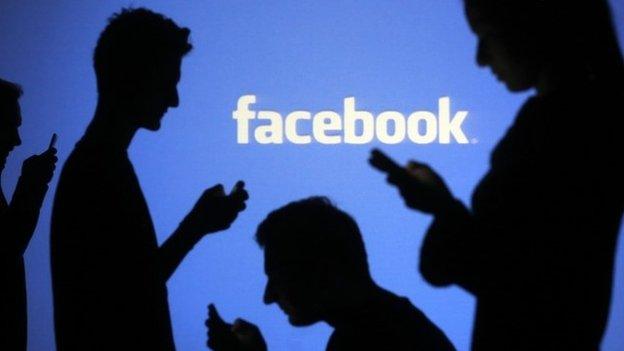
- Published6 October 2014
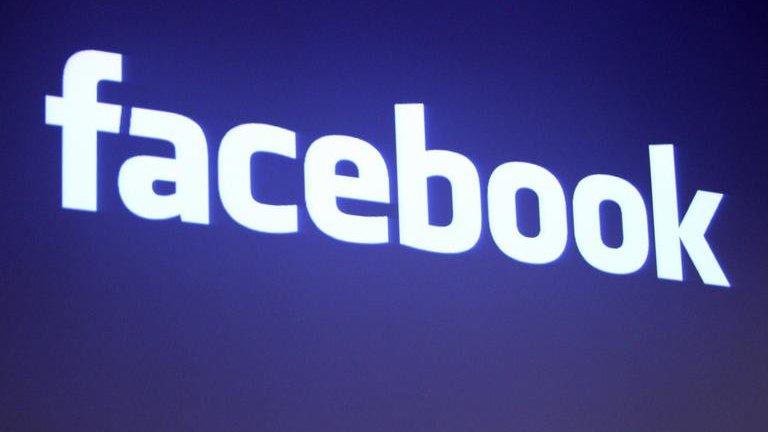
- Published11 November 2014
